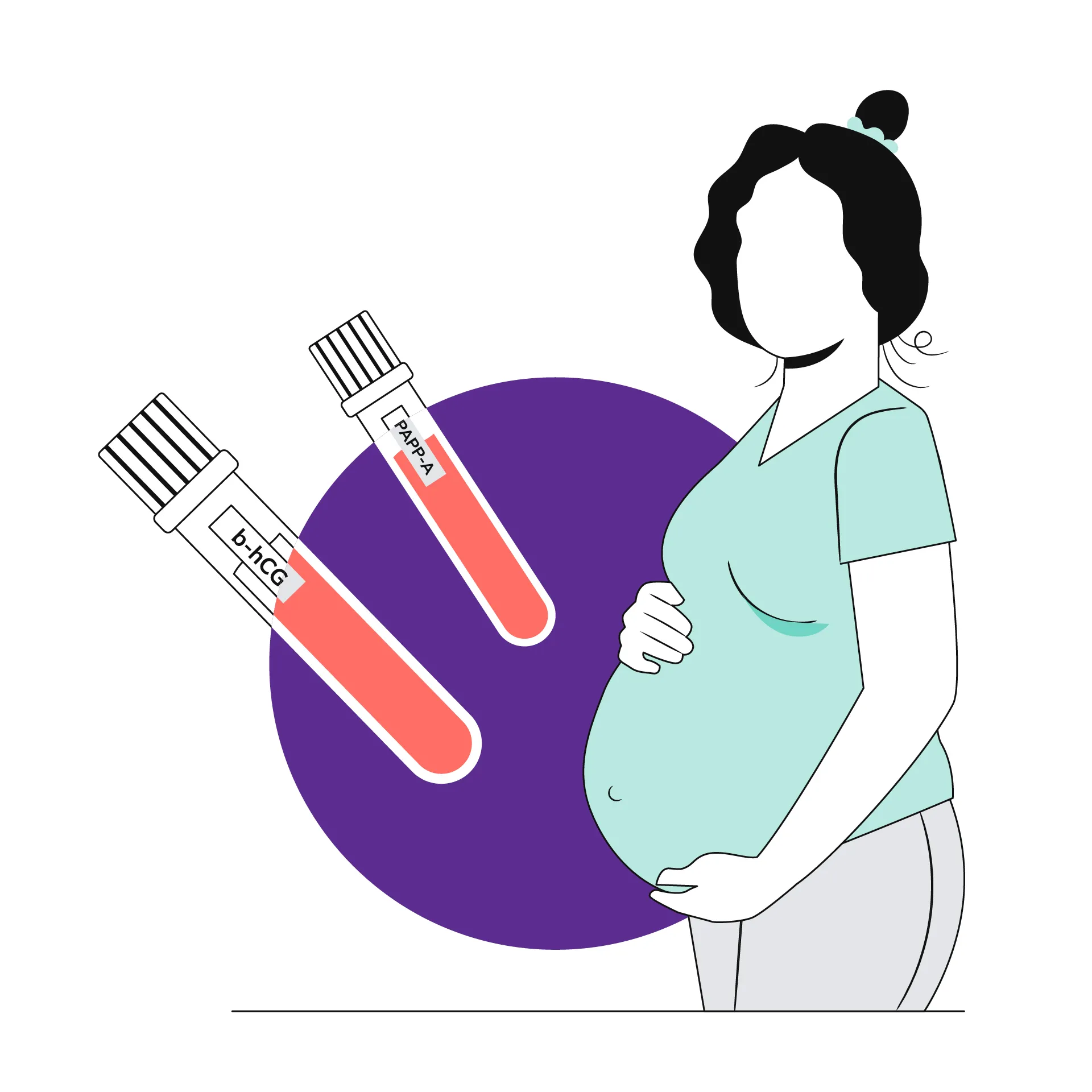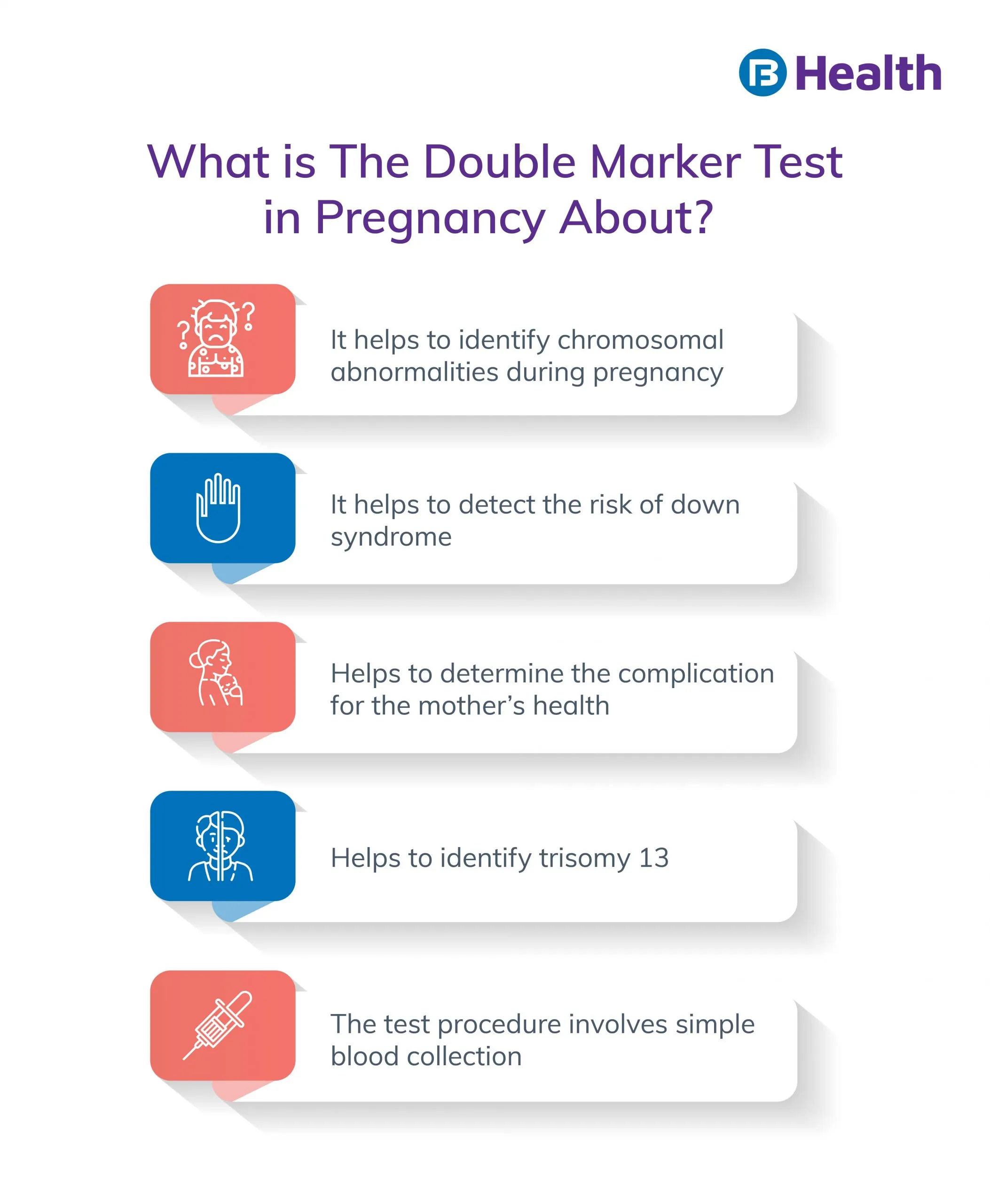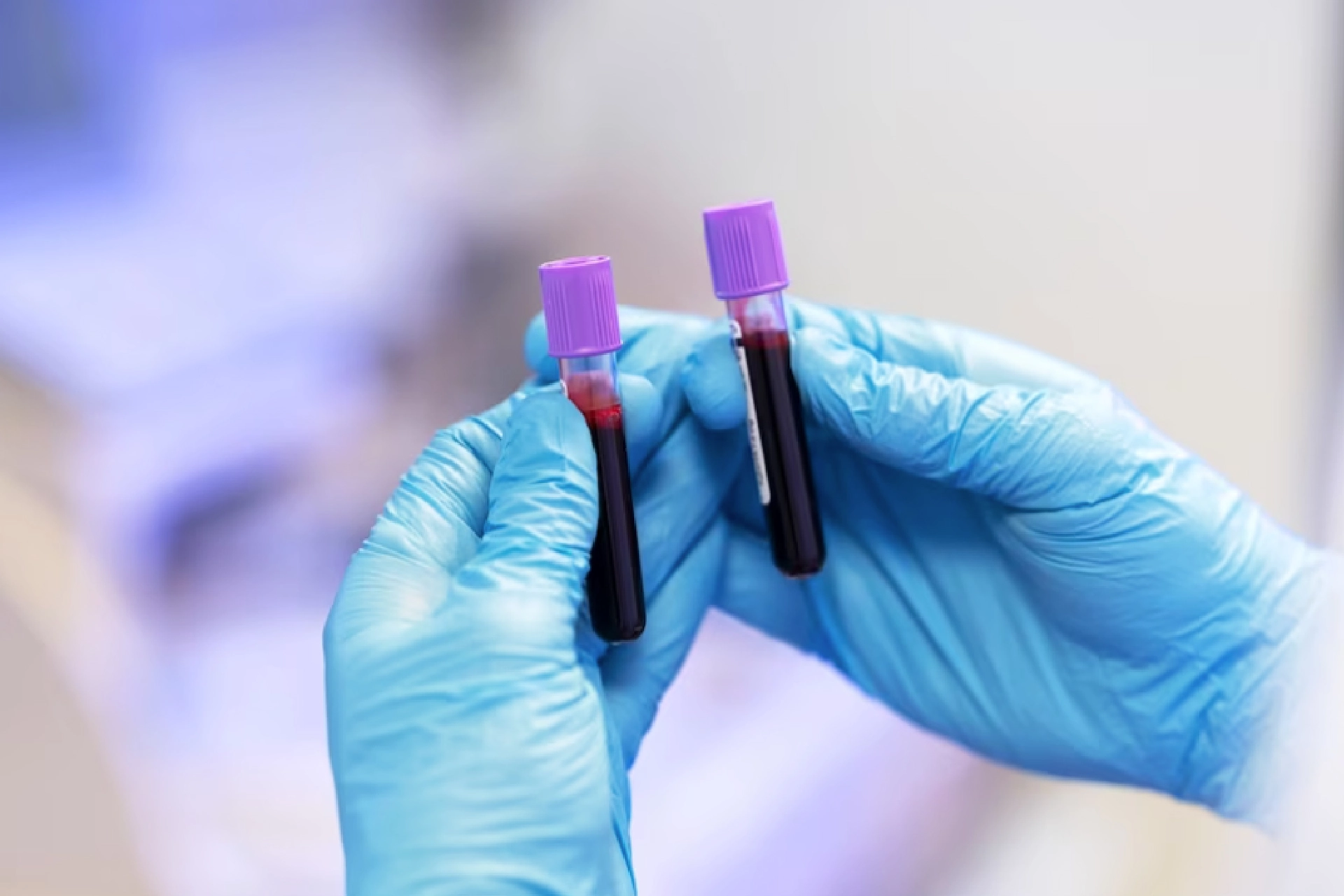Health Tests | 7 min read
Double Marker Test in Pregnancy: Uses and Procedure
Medically reviewed by
Table of Content
Synopsis
Parents usually have mixed feelings of hope, happiness, and worry about their upcoming child. To avoid all the uncertainty regarding Foetus health, doctors suggest many pregnancy tests to be double sure, and one such test is a double marker test in pregnancy.
Key Takeaways
- This test also helps to identify neurological conditions like down’s syndrome
- For this test, no special preparation is required other than the mother’s blood
- It is a predictive test, not a definitive test
The double marker test determines the chromosomal malformation in the fetus. It is also referred to as maternal serum screening, which helps to analyze a child's health condition via a blood test. The chromosomal abnormalities are identified from the level of beta-hCG stands for beta-human chorionic gonadotrophin, and PAPP-A for pregnancy-associated plasma protein A in blood. The blood test and the nuchal translucency scan enhance the test report's certainty. The scan measures the nuchal fold thickness, an area of tissue at the back of the growing fetus. The thickness gives an idea of down syndrome and other genetic problems.
What Are Chromosomal Abnormalities?
Before knowing more about the double marker test, let us get a small idea of chromosomal abnormalities. Chromosomes are said to be structures that hold genes. In a normal pregnancy, there will be 22 pairs of XX chromosomes in the female fetus and 22 XY in the male fetus. The abnormalities can be either numerical or structural. In the case of numerical, an individual might be missing one of the chromosomes from a pair or has more than two chromosomes, whereas, in structural, the chromosome's structure has been altered.
Down syndrome and Edward's syndrome come under the condition where an extra chromosome is seen in pregnant women. Levels of beta-hCG and PAPP-A are below or above average in pregnant women dealing with chromosomal abnormalities.
This condition may lead to deformities or health-related problems in the child after birth. However, this happens in very rare cases. Thus, a double marker test in pregnancy helps to understand the seriousness of the abnormality.
Is a Double Marker Test in Pregnancy Recommended for All?
It is not compulsory for all. It is suggested for those above 35 age or those with higher chances of chromosomal abnormalities due to family history or certain other factors.
Remember, this test only shows the level of risk of chromosomal abnormalities. It is predictive, not definitive.
Additional Read: 7 Natural Do-It-Yourself Pregnancy Tests
Benefits of Taking Double Marker Tests in Pregnancy
- This test gives the couple time to analyze the state and make further decisions.
- It helps to detect trisomy of chromosome number 13, responsible for severe intellectual disability and physical abnormalities.
- The double marker test helps to detect down syndrome.
- It helps to determine the risk factor for the mother's health.
What Is the Procedure?
This test involves an ultrasound test with the blood sample. The test is held between 11 to 14 weeks, nearly the end of the first trimester or early days of the second trimester. The screening looks for two markers, beta-hCG and PAPP-A. Pregnant women can eat and drink before the test as usual unless it is instructed.
A high level of beta-hCG and a low level of PAPP-A indicates the risk of Down syndrome. You can expect a lab test within three days to a week. However, it is good to take confirmation at the time of the test. You can also confirm other details, like a lab test discount if required.
Health care providers may also suggest other tests like Hemoglobin and VDRL tests.
Additional Read: Hemoglobin TestWhat Are the Uses of the Double Marker Test?
- It gives the idea of the risk of any physical ailment.
- The doctor can understand whether there is a loss of muscle mass or excess growth of skin behind the neck of the baby.
- Detect physical abnormalities like stunted growth, physical handicaps, feet deformation
- Helps to detect trisomy 18, which leads to mental retardation and deformities in the body organs, heart, lungs, and intestine
- Prevent the chances of down syndrome
- Effective detection rates

How Do Analyze Test Reports?
The screening report falls into three categories low, moderate, or high risk. The test result is presented in ratios.
A ratio of 1:10 to 1:250 is considered to be a high risk for the mother and developing embryos. A ratio of 1:1000 or above elevates the possibility of low risk. Doctors usually don't prescribe further tests if the result is negative. It depends on the factors like family history and age. Yet another thing to be noted here is that first-trimester screening only looks at markers for Down syndrome, trisomy 13, and trisomy 18, not other conditions.
If the report is positive doctor may suggest tests like amniocentesis, chorionic villous sampling, or noninvasive prenatal testing. These tests provide more definiteness, whereas certain risks are associated with it.
Normal Range of Double Marker Tests in Pregnancy
The normal value for the double marker test is 25700-288000 mIU/ml, for beta- hCG and PAPP-A are 1 MoM in pregnant women for all age groups.
The process of double marker test
The procedure of double marker tests in pregnancy is simple blood collection. No other complications are associated with it.
- A syringe is injected into arteries to collect the blood sample.
- An elastic band is tied across arms to swell the portion of blood vessels.
- After arteries get visible, antiseptics are used to clean the area.
- The needle is injected to collect a sample and kept safely for testing.
- Chances are there to experience excessive bleeding where the needle is a prick; consult the doctor in case of any concern.
How to Have a Healthy Pregnancy after Your 30s?
The birth rates for women after their 30s have increased over the periods. However, complications while delivery can be expected. Here are a few steps to having a healthy pregnancy. [1]
- Healthy Diet: You need to include nutritious food in your daily diet. Vegetables like spinach, beans, fruits, and whole grains are good nutritious sources. You can also prepare a diet chart with the help of a doctor.
- Exercising: Even the doctor recommends having bodily movement with low impact. You can go walking, jogging, or do yoga classes. You can take the doctor's advice before planning the routine.
- Stop Smoking and Say No to Alcohol: Smoke and alcohol during this time can harm your growing baby. Hence avoid these kinds of unhealthy practices.
- Sleep Properly: A proper sleep pattern benefits a growing baby. Try to get 7 to 9 hours of sleep. If possible, get in bed early.
- Manage Pre-Existing Chronic Conditions: Women above 35 are at risk of health problems such as diabetes, blood pressure, and heart disease. Be aware of your health condition and monitor it thoroughly.
- Don't Miss Your Medicines: Essential vitamins are suggested by health care providers during this time. Do not miss it. Eat all the medicines prescribed by a doctor. In case any side effects arise, consult the doctor immediately.
- Regular Check-Ups: You will have to visit your doctor every month during pregnancy. Try not to miss your appointment; in case it happens, fix another appointment. If you are suffering from other health conditions, don't forget to monitor your health status.
Cost of Double Marker Test in Pregnancy?
The double marker test cost depends on the institution, location, sensitiveness of instruments, and machines utilized for test results. Check with your insurance provider whether the double marker test cost is covered if you have health insurance.
You can also call the institutions directly to cross-check the cost and any discount available. The test is more effective with NT scan; enquire about the cost of NT scan too.
After paying the cost of both tests, you will receive the first-trimester screening report.
Pregnancy is the most beautiful time when women feel completeness, compassion, joy, and love. If you are worried about test results, start by questioning its advantages and disadvantages. Try to ask how well it will do to manage your pregnancy and mental condition and find what the double marker test means to you. Sometimes the test result may put you in a confusing state. Try not to panic and hope for the best. Be sure to check all the information before making any decision; the best way to do it is to contact your health care provider.
You may find it hard to ask specific questions in the doctor's chamber. Thus Bajaj Finserv Health offers virtual consultation, where you can clear all your doubts with one click. It is also a good option if you want a second opinion. Bajaj Finserv Health also avails certain other facilities for complete health solutions. For online consultation, you have to signup in the Bajaj Finserv Health application providing the required details. You can schedule your appointment at your comfort from any location. You may feel a double marker test in pregnancy is a hard choice but remember certainty best than doubt.
References
- https://www.obgynwestside.com/blog/9-tips-for-a-healthy-pregnancy-after-age-35
Disclaimer
Please note that this article is solely meant for informational purposes and Bajaj Finserv Health Limited (“BFHL”) does not shoulder any responsibility of the views/advice/information expressed/given by the writer/reviewer/originator. This article should not be considered as a substitute for any medical advice, diagnosis or treatment. Always consult with your trusted physician/qualified healthcare professional to evaluate your medical condition. The above article has been reviewed by a qualified doctor and BFHL is not responsible for any damages for any information or services provided by any third party.




